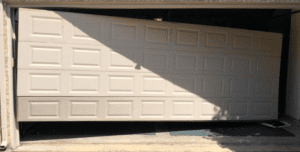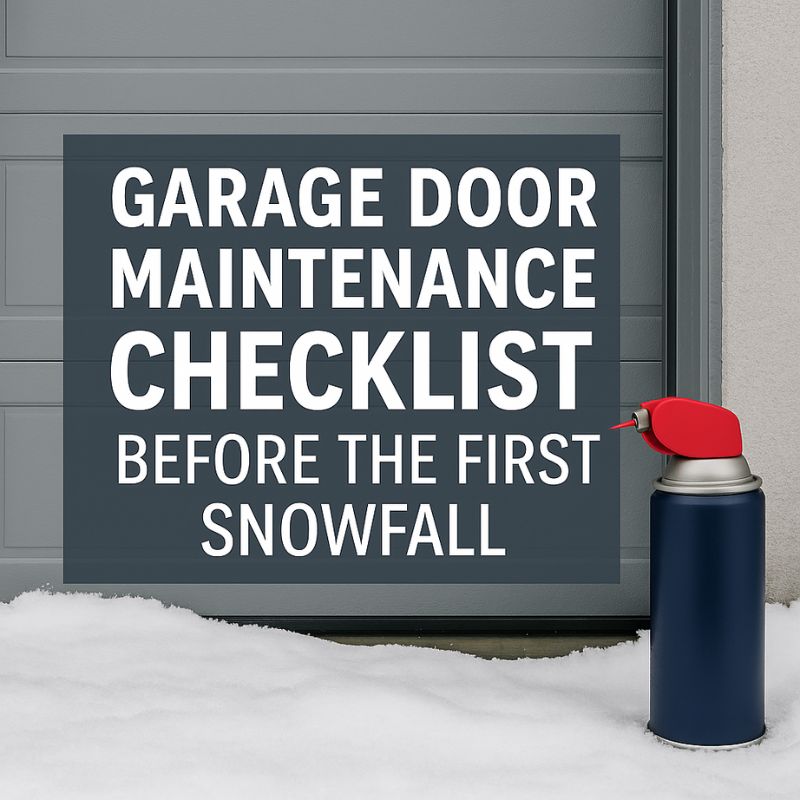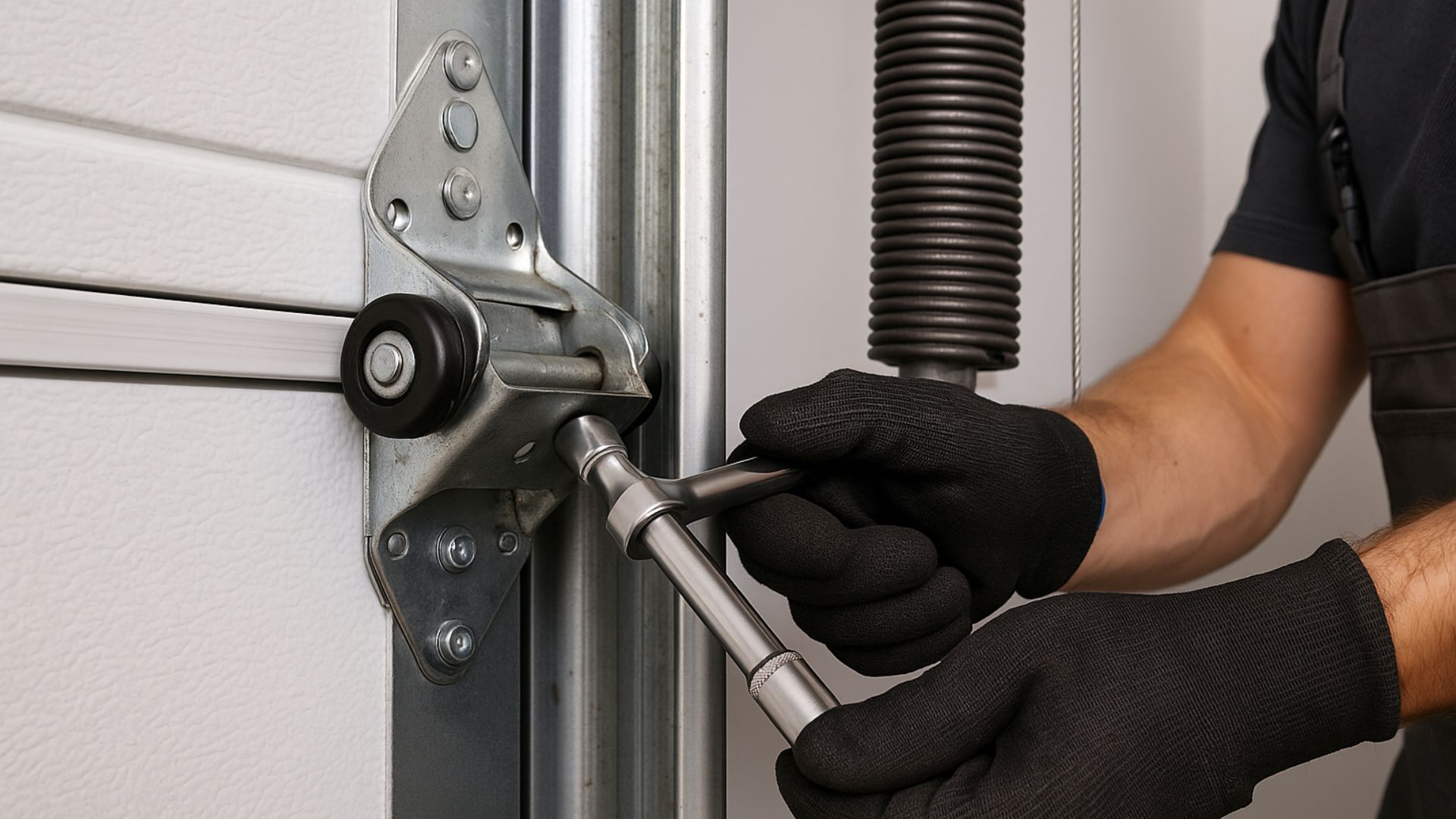Garage Door Won’t Close All the Way? Here’s How to Fix It
When your garage door stops short, reverses suddenly, or simply won’t budge, it creates more than just frustration. A stuck or malfunctioning garage door can affect your security, energy efficiency, and even your safety.
Luckily, many of the most common problems are easy to spot—and some can be fixed without professional help. This article explains the top reasons your garage door won’t close completely and how to fix a garage door that’s not cooperating.
1. Safety Sensors Are Blocked or Misaligned
Most modern garage doors come equipped with safety sensors—two small units near the base of your door on either side. These sensors communicate using an invisible beam. If something breaks that beam, the door automatically stops or reverses to prevent injury or damage.
Signs of a Sensor Issue:
- Door closes partway, then opens again
- The opener’s lights blink rapidly
- You hear the motor activate, but the door won’t stay down
How to Fix It:
- Gently clean the lenses with a soft, dry cloth.
- Make sure nothing is sitting in the doorway.
- Ensure the sensors are directly facing each other and aligned at the same height.
- A steady light on both sensors usually means they’re working properly.
If you clean and align them and the door still won’t close, it may be time to call a garage door repair service to inspect the wiring or replace a faulty sensor.
2. There’s an Obstruction in the Door’s Path
This one’s easy to overlook. Even small debris on the garage floor can block the door from closing fully.
Common Obstructions:
- Rocks or garden tools near the threshold
- Ice buildup or frozen leaves in winter
- Uneven concrete or a warped floor
What You Can Do:
- Sweep or clear the floor near the bottom of the garage door.
- Look for anything that could be preventing a tight seal.
- Consider installing a flexible bottom seal to help close your garage door snugly.
3. Garage Door Tracks or Rollers Are Damaged
Your garage door opens and closes by gliding along metal tracks with the help of rollers. If the tracks are bent or the rollers are damaged, the door might stop short or get stuck.
What to Check:
- Look for gaps between the track and wall.
- Check for visible dents, warping, or rust.
- Listen for grinding, squeaking, or popping sounds as the door moves.
Fix:
- Clear debris from the tracks.
- Apply a silicone-based lubricant to the rollers.
- Avoid trying to straighten bent metal tracks on your own—this could make things worse. Instead, contact a qualified garage door service.
4. The Limit Settings Are Off
Garage door openers use limit switches to control how far the door travels when opening or closing. If the “down limit” is set too high, the door may stop before touching the ground. If it’s set too low, the door may hit the floor, reverse, or stay stuck.
Symptoms:
- Door stops a few inches off the ground
- The motor keeps running after the door stops
- The door closes, then immediately reverses
How to Adjust:
- Locate the limit adjustment screws or dials on your opener (usually labeled “Up” and “Down”).
- Use a flathead screwdriver to make small adjustments to the “Down” setting.
- After each turn, test the door to see if it closes fully and stays down.
If adjusting the limits doesn’t solve the problem, your opener may need professional recalibration or replacement.
5. Broken Springs or Cables
Your garage door’s springs and cables help balance the weight of the door and control its motion. If a spring breaks or a cable snaps, your door may close unevenly or stop entirely.

How to Tell:
- The door is crooked or hanging off-center
- You heard a loud snap or bang in the garage
- The door is heavy or difficult to move manually
- It drops quickly or slams when closing
Important:
Do not attempt to replace springs or cables yourself. These parts are under extreme tension and can cause serious injury. Always hire a professional repair service for this job.
6. The Opener Itself May Be Failing
If your sensors, tracks, and limits are all working—but the door still won’t move—the issue may lie with the garage door opener. Openers can wear out over time, especially if they’re more than 10 years old.
Signs of Opener Failure:
- Remote works sporadically or not at all
- Opener hums but does not move the door
- Door stops midway and refuses to respond
How to Fix It:
- Replace the batteries in your remote.
- Try using the wall switch to isolate the issue.
- Reprogram the remote if needed.
- If the opener still doesn’t work, it may need to be repaired or replaced.
Upgrading to a smart opener can also improve security and convenience—especially if you want to monitor or open or close your garage from your phone.
7. Electrical or Power Problems
Sometimes, the issue is as simple as your opener losing power.
What to Do:
- Check that the opener is plugged into a working outlet.
- Test the outlet with another device, like a lamp or charger.
- Inspect the breaker panel and reset the circuit if necessary.
If the outlet has no power, you may need to call an electrician. Otherwise, restoring power to the opener should allow your garage door to function normally again.
8. Weather Conditions Can Affect Operation
Extreme cold, heat, or humidity can impact how well your garage door operates—especially if it’s older or not properly insulated.
How Weather Causes Problems:
- Cold temps can cause metal components to contract or become brittle.
- Ice buildup can block the door from closing.
- Expansion of materials in the heat may affect alignment.
Prevention Tips:
- Apply lubricant to hinges and rollers seasonally.
- Use a de-icer or shovel to keep the area around the door clear in winter.
- Install a weather seal or insulated garage door for better performance year-round.
9. Manual Lock or Override Is Engaged
Garage doors often include a manual lock or slide bolt. If this feature is engaged, the opener won’t be able to move the door at all.
What to Check:
- Look for a small metal lock bar near the center of the inside of the door.
- Make sure the bar isn’t engaged or blocking the track.
Disengage the lock, then try to close your garage door again.
When to Call a Garage Door Repair Professional
If you’ve gone through this checklist and your door still won’t close—or if you’ve identified a broken part you shouldn’t fix yourself—it’s time to call a local garage door repair service.
A professional can:
- Diagnose electrical or mechanical problems quickly
- Replace worn springs, cables, or tracks
- Reprogram or replace your opener
- Ensure the door is operating safely and efficiently
Third Gen Garage Doors provides fast, affordable garage door service across the Denver metro area. Whether you’re dealing with a stuck door, opener failure, or worn-out components, our experienced technicians are ready to help.
Final Thoughts
When your garage door won’t close all the way, it’s usually due to one of a handful of common issues—safety sensor problems, obstructions, opener settings, or worn parts. Some are simple to fix yourself. Others require a trained professional to ensure your door works safely and reliably.
Still stuck? Don’t let a faulty garage door put your home or business at risk. Contact Third Gen Garage Doors today for expert repair service you can trust.






